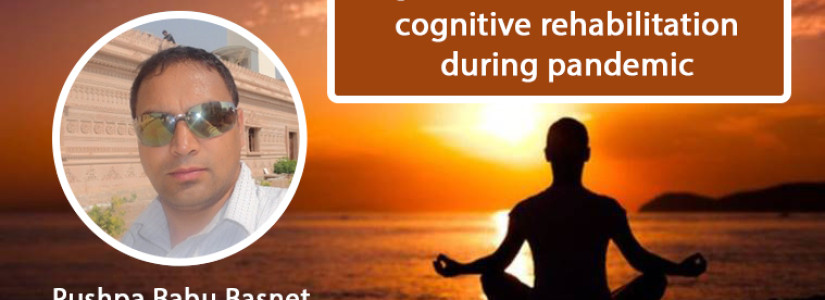CT- scan and MRI centers in Kathmandu
6 November, 2020CT- scan and MRI centers in Kathmandu...
Read More
 Yoga is extraordinary for extending, for relaxing, reinforcing, and conditioning. It is ideal for practicing careful development and Mindfulness engaged consciousness of one's quick understanding from moment to moment, in a nonjudgmental way, as though this is the main moment one has in his/her life. The experience is one of a moment-by-moment consideration regarding contemplations, feelings, physical sensations, and the environment. “Our mind is designed to construct meaning out of the experience, and that constructed meaning is encapsulated by conscious thoughts” (Pradhan, 2015, P.178). In the current situation of this pandemic, mindfulness meditation is essentially a subjective procedure that includes figuring out how to move and concentrate freely onto an object of decision, for example, real sentiments or a passionate encounter, while withdrawing from common molded reactivity or elaborative preparing.
Yoga is extraordinary for extending, for relaxing, reinforcing, and conditioning. It is ideal for practicing careful development and Mindfulness engaged consciousness of one's quick understanding from moment to moment, in a nonjudgmental way, as though this is the main moment one has in his/her life. The experience is one of a moment-by-moment consideration regarding contemplations, feelings, physical sensations, and the environment. “Our mind is designed to construct meaning out of the experience, and that constructed meaning is encapsulated by conscious thoughts” (Pradhan, 2015, P.178). In the current situation of this pandemic, mindfulness meditation is essentially a subjective procedure that includes figuring out how to move and concentrate freely onto an object of decision, for example, real sentiments or a passionate encounter, while withdrawing from common molded reactivity or elaborative preparing.
“Mindfulness meditation is cognitive processing” (Pradhan, 2015), in which considerations are seen as just musings instead of thinking about them as genuine encounters. When contrasted with the concentrative meditation, in mindfulness meditation, one's consideration is intentionally kept more extensive, using an increasingly open and liquid concentration yet without connecting with a logical idea or examination Mindfulness may use any object of consideration regardless of whether a feeling, the breath, a physical preference, a picture, or an outside article with the end goal that there is more adaptability in the object of mindfulness than there is in concentrative mediation and to such an extent that the item may move from moment to moment. According to Khanna & Greeson, (2013) “Yoga and mindfulness teachings share a fundamental belief in “mindful” awareness of experiences and emotions as they arise, without having to change them. Addictions are born as a result of “mindless” states involving escapist attitudes, automatic thinking, emotional reactivity, and social isolation” (p.7).
Regardless of mindfulness bases cognitive therapies (MBCT's) impressive potential for improving mental wellbeing for patients, there is minimal observational proof to help its viable application in Chinese. This audit will characterize meditation and mindfulness, give an outline of the improvement of MBCT, recognize the proof for the viability of MBCT, and offer suggestions to medicinal workforces on the most proficient method to offer help for patients accepting care mediation. It is also used for Interventions for a variety of mental and physical illness Mindfulness-based practices delivered in school settings. In this issue demonstrate how mindfulness can be used to help to improve student-teacher relationships, reduce ADHD symptomology, promote emotion regulation, and reduce stress among school-age youth.
Yoga and mindfulness-based cognitive therapy help to improve student’s teachers’ relationships, advance feeling guidelines, and diminish worry among school-age youth. Yoga and mindfulness-based cognitive therapy help to improve student’s teachers’ relationships, advance feeling guidelines, and diminish worry among school-age youth. A developing number of studies have exhibited that advancement of these abilities is related with a wide cluster of positive results in grown-up populaces, for example, improved health, decreased uneasiness, sorrow, substance use and mental misery in the clinical and nonclinical population (Miller, Fletcher, and Kabat-Zinn, 1995),. Ongoing audits of this writing infer that these outcomes should just be considered "promising" as of now because of the moderately frail plans, measures, and the nonappearance of follow-up information care that may advance positive youth improvement and the conditions under which care based practices may be demonstrated. In setting up this extraordinary issue, we requested commitments speaking to the various scope of ways to deal with conceptualizing care and evaluating results.
It should apply for a mindfulness-based training course with respect to preschool-age kids' conduct. Care to prepare to instructors is focused to change tyke conduct and student-teacher collaborations viability of manual zed care based preparing program, figuring out how to breathe, on various components of the pre-adult feeling guideline, stress, and physical manifestations. This examination gives a solid case of a gathering based trial configuration explicitly focused to meet the social-enthusiastic necessities of pre-adult. This investigation likewise gives some remarkable knowledge into the chances and difficulties related to actualizing care based mediations at the all-inclusive dimension in secondary school settings. Care based methodologies may advance positive formative results among children in youth in school settings.
I believe while just doing yoga can help control stress and unfasten individuals from substance use motivations at the time. Khanna & Greeson, (2013) also suggest that ideal treatment and prevention results may originate from using the full arrangement of useful frames of mind, points of view, and self-guideline aptitudes encapsulated by customary Hatha yoga (Ashtang yoga) and mindfulness meditation.
In conclusion, Yoga and mindfulness-based cognitive therapy help to improve each other’s relation. However mindfulness-based cognitive therapies led to the development of clinical interventions and have a strong evidence base documenting their effectiveness cognitive psychology and cognitive-behavioral therapy, initially presented as attention Control Training, and primarily focused on treating psychiatric disorders Identify the evidence for the effectiveness of MBCT, and we offer recommendations to medical personnel on how to provide support for patients receiving mindfulness intervention.
Works cited
Pushpa Babu Basnet
(M. Phil. Scholar- Health Education)
Nepal Open University
Leave a comment